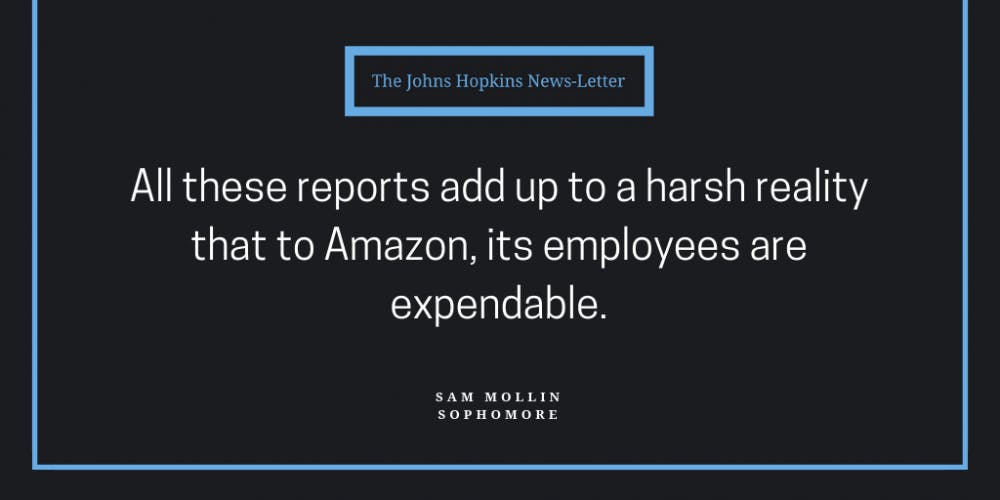This past Labor Day, tens of thousands of workers employed at Amazon fulfillment centers appreciated one of their few days of rest. It was doubtlessly a needed reprieve from working conditions so strict that Amazon fired a worker for seven minutes of unproductivity, forced employees to walk over 15 miles a day and caused one employee to state that [Amazon] kills you mentally and physically.
Amazon profits off of a system so inhumane that the National Council for Occupational Safety and Health placed Amazon on its list of “Dirty Dozen” employers for its failure to solve a disturbing amount of safety hazards that led to seven deaths since 2013. Yet Amazon continues to thrive, joining scores of companies that get away with blatant dehumanization and abuse of its workers.
For Hopkins students, it’s become a necessary evil in our lives, providing everything from last minute dorm supplies to cheap textbooks. However, we must stop supporting Amazon in light of its inhumanity and take responsibility for where we put our dollars.
Workers toil in slave-like conditions for poverty-level wages. In 2011, Amazon brutally kept the doors of its Lehigh Valley warehouse in Pennsylvania shut in 110 degrees Fahrenheit heat. Instead of helping its heat-stricken workers by giving them time off or cooling the warehouse, Amazon simply placed emergency medical technicians and paramedics outside the warehouse, knowingly subjecting its workers to dangerous working conditions.
The Morning Call, a daily newspaper in Pennsylvania, reported that warehouse supervisors forced employees to sign papers saying their heat-related symptoms were not due to working conditions. Supervisors also threatened to fire workers who spoke to the press about poor working conditions.
The Call also found that the Lehigh Valley warehouse operated under a system of hiring new workers, burning them out through inhumane work quotas and conditions, and then replacing them with new workers. The warehouse would also hire workers from temp firms instead of hiring workers themselves — allowing the warehouse to be shielded from lawsuits over worker mistreatment — and simply replace old workers who couldn’t work anymore.
This important expose has been corroborated by other publications, including TheStreet, The Verge, Vanity Fair and Vox, which have provided overlapping accounts of Amazon workplace cruelty. One report included Amazon forcing employees to work up to 50 hours a week under threat of being fired. Supervisors also closely monitors employees to ensure they do not even spend an extra minute on a bathroom break, leading employees to urinate in water bottles. Fifty-five percent of Amazon employees reported symptoms of depression after they had begun their jobs.
All these reports add up to a harsh reality that to Amazon, its employees are expendable.
In response to these reports, Amazon stated that the average pay for its warehouse workers exceed $15 an hour and that its employees get full benefits. Employees also began claiming on social media that they loved their jobs.
However, these claims were misleading. Using the average pay of workers instead of the median allows higher paid warehouse workers such as supervisors to obscure the reality of what most of the employees make, allowing for the likely possibility that the more accurate median pay measure is much lower.
Additionally, while full benefits and high pay may apply to full-time Amazon employees, this does not apply to the unknown but likely significant amount of workers hired from temp agencies that Amazon uses. Furthermore, the benefits to full-time workers don’t even matter given high turnover rates. What’s more, reporters revealed that the positive employee reviews were the result of bribes from Amazon in the form of paid vacation days and gift cards.
If we want to change Amazon’s behavior, the time is now. All it takes is you and your wallet. Support brick-and-mortar stores that help out the local economy. If Amazon wants our money, it has to treat its workers with respect.
Sam Mollin is a sophomore majoring in Political Science and Environmental Studies from Larchmont, N.Y.





